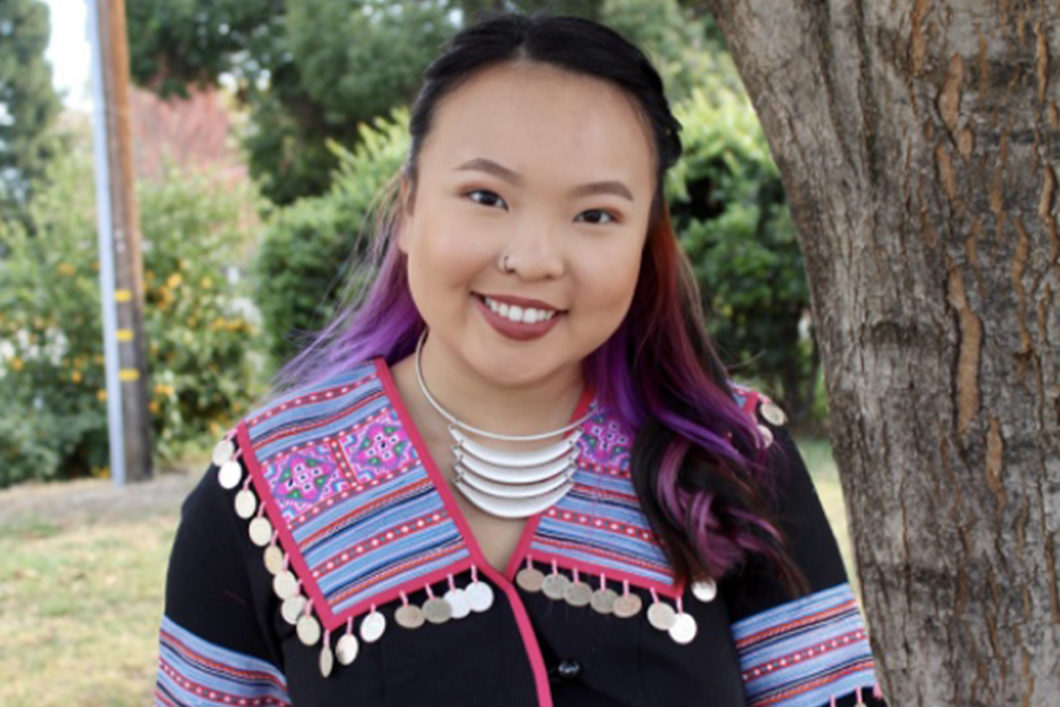Nkauj-Huab (Go-Hua) Lo is a Hmong American who’s always gone by her middle name “Melydia” because it was easier for others to pronounce. It wasn’t until she started seeking out opportunities and found a professional acquaintance who was persistent in calling her “Nkauj-Huab” that she started finding her place within CSD. This reminded Nkauj-Huab to never let go of her roots and to continue telling her story the way it’s supposed to be told.
Quick Facts About Nkauj-Huab
- Undergrad CSD student at California State University, Chico
- Looks forward to working as a bilingual SLP in the education setting
- National NSSLHA member for 1 year
- Always uses #pozitive in social media posts as a reminder to stay positive!
What’s Been Your Greatest Challenge as a CSD Student?
“At times, I’ve felt like I’ve been living a double life . . .
As a Hmong American, I’ve always felt like I had to meet the expectations of the model minority myth—making sure I was smart enough and obtain good grades. If I didn’t meet those ‘expectations,’ I wasn’t Asian enough.
Throughout school, I’ve sometimes gone by my middle name, ‘Melydia.’ Some know me as Melydia, but some know me as Nkauj-Huab. Even though I’m the same person, it often felt like I needed to pick and choose what name to go by.
As a CSD student, not seeing faces like mine within my cohort, or even within the professions, has always been challenging. Early on in my coursework, I felt like I didn’t have anyone to mentor me who would understand my perspective. I never used to ask questions because I thought it was a sign of weakness. I doubted myself and often felt discouraged. Because I felt so invisible and isolated, I questioned if I really wanted to pursue this field, and even thought about changing majors at one point.
When I’m with family or friends who share my Hmong American culture, I feel like I must explain why I want to become a speech-language pathologist because there’s no direct translation in Hmong. This makes me want to work harder to find (or create!) more resources and awareness to my community. There’s such a great need for more Hmong SLPs.
It’s hard to explain, but for so long, I was having feelings of imposter syndrome.”
How Have You Overcome Feeling Imposter Syndrome?
“Once I started getting curious and asking questions, opportunities opened for me. I began connecting with more and more SLP’s and CSD students, which made me realize I wasn’t alone!
Asking for help led me to National NSSLHA and ASHA’s Asian Pacific Islander Speech-Language-Hearing Caucus, where I found so many individuals who look like me, inspire me, and motivate me. Meeting other AAPI peers helped me know that I’m not the only with these negative feelings. They check on me often and remind me that I’m capable and needed in the professions. These connections have motivated me to continue pursuing speech-language pathology. It’s the support system I needed, and I now feel like I hold a place in this field.
It’s also made me realize I need to be a part of the change within CSD. My biggest motivation is that there aren’t many faces like mine. It makes me work harder to bring awareness about diversity, equity, and inclusion. Today, I’m able to embrace my culture and my identity, and I hope to one day be the mentor to another student that all my other AAPI peers were to me.”
What Advice Would You Give Others Who Feel Similarly?
“My advice is to not be afraid to seek help. As a Hmong American inspiring to be an SLP, it was hard to find someone to connect with and understand my perspective. But I stayed persistent and kept asking questions. I kept seeking opportunities that would make me feel included. I didn’t give up.
Being a new National NSSLHA member has taught me to learn to reach out and network—and it’s given me the opportunities to do so! I’ve met so many wonderful individuals . . . which led to me having the chance to share my experience and voice with others. It’s made me feel confident and validated about wanting to become an SLP.
National NSSLHA is an organization that values diversity, equity, and inclusion. By being a part of this community, not only will I continue in my own growth, but I’ll have opportunities to share my experience and reach other students like me.”

